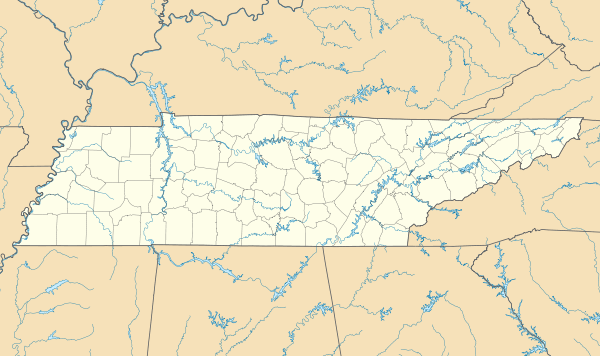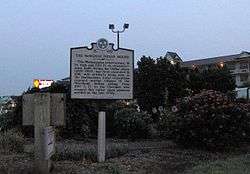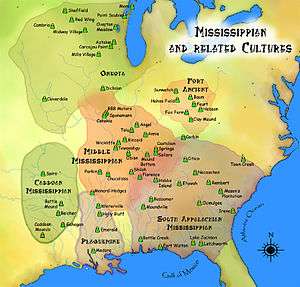McMahan Mound Site
|
Tennessee Historical Commission sign marking the site of the McMahan Mound | |
 Location within Tennessee today | |
| Location |
Sevierville, Tennessee, Sevier County, Tennessee, |
|---|---|
| Region | Sevier County, Tennessee |
| Coordinates | 35°51′49.93″N 83°34′3.9″W / 35.8638694°N 83.567750°W |
| History | |
| Founded | 1200 CE |
| Abandoned | 1500 CE |
| Periods | Dallas Phase |
| Cultures | South Appalachian Mississippian culture |
| Site notes | |
| Excavation dates | 1881 |
| Archaeologists | William H. Holmes |
| Architecture | |
| Architectural styles | platform mound |
| Architectural details | Number of temples: 1 |
The McMahan Mound Site (40SV1), also known as McMahan Indian Mound, is an archaeological site located in Sevierville, Tennessee just above the confluence of the West Fork and the Little Pigeon Rivers in Sevier County.
Site description
The site consisted of a 16 feet (5 m) high and 240 feet (73 m) wide platform mound, with a large associated village surrounded by a palisade. It was occupied by Dallas Phase peoples of the South Appalachian Mississippian culture between 1200 and 1500 CE.[1] At the time it was first investigated scientifically in 1881 the mound was located on a farm owned by the McMahan family for whom it is now named.
Excavations

Excavations by William H. Holmes in 1881 unearthed burials, arrow-points, a marble pipe, Mississippian culture pottery, and numerous engraved shell gorgets and columnella pendants. Several items of European manufacture were found in the excavations, including brass pins and cylindrical glass beads, implying that the mound site had been inhabited during the time of European contact in the American Southeast.[2] One fragmentary engraved shell gorget found during the excavations was particularly noteworthy. It depicts two S.E.C.C. "Birdmen" with wings and talons for feet grasping each other by the neck with one hand and wielding ceremonial flint blades with the other.[3] This type of gorget is carved in what is now known as the Hightower style. Holmes also uncovered several "rattlesnake" and mask style gorgets as well as a curious gorget with looping lines that Holmes described as "very interesting object.....The figure is so obscure that considerable study is necessary in making it out."[2] These pieces are in the styles now known as the Lick Creek style and Citico style for the rattlesnake gorgets, Chickamauga style for the mask-like gorgets and Williams Island or Spaghetti style for the last.[4][5]
References
- ↑ Tennessee Historical Commission Marker, "McMahan Indian Mound," in Sevierville, Tennessee. Information accessed 3 September 2007.
- 1 2 Holmes, William H. (1884). "Illustrated Catalogue of a Portion of the Collection Made During the Field Season of 1881". =Third Annual Report of the Bureau of Ethnology to the Secretary of the Smithsonian Institution, 1881-82. Washington: Government Printing Office. pp. 427–510. Retrieved 2012-05-08.
- ↑ MacCurdy, George Grant (1913). "Shell Gorgets from Missouri". American Anthropologist. 15 (3): 410. doi:10.1525/aa.1913.15.3.02a00020. JSTOR 659757.
- ↑ Hally, David J. "Mississippian Shell Gorgets in regional perspective". In King, Adam. Southeastern Ceremonial Complex : Chronology, Content, Context. University of Alabama Press. pp. 185–231. ISBN 978-0817354091.
- ↑ Muller, Jon (1966). "The Citico Style". An experimental theory of stylistic analysis (PDF) (Doctoral thesis). Harvard University.


